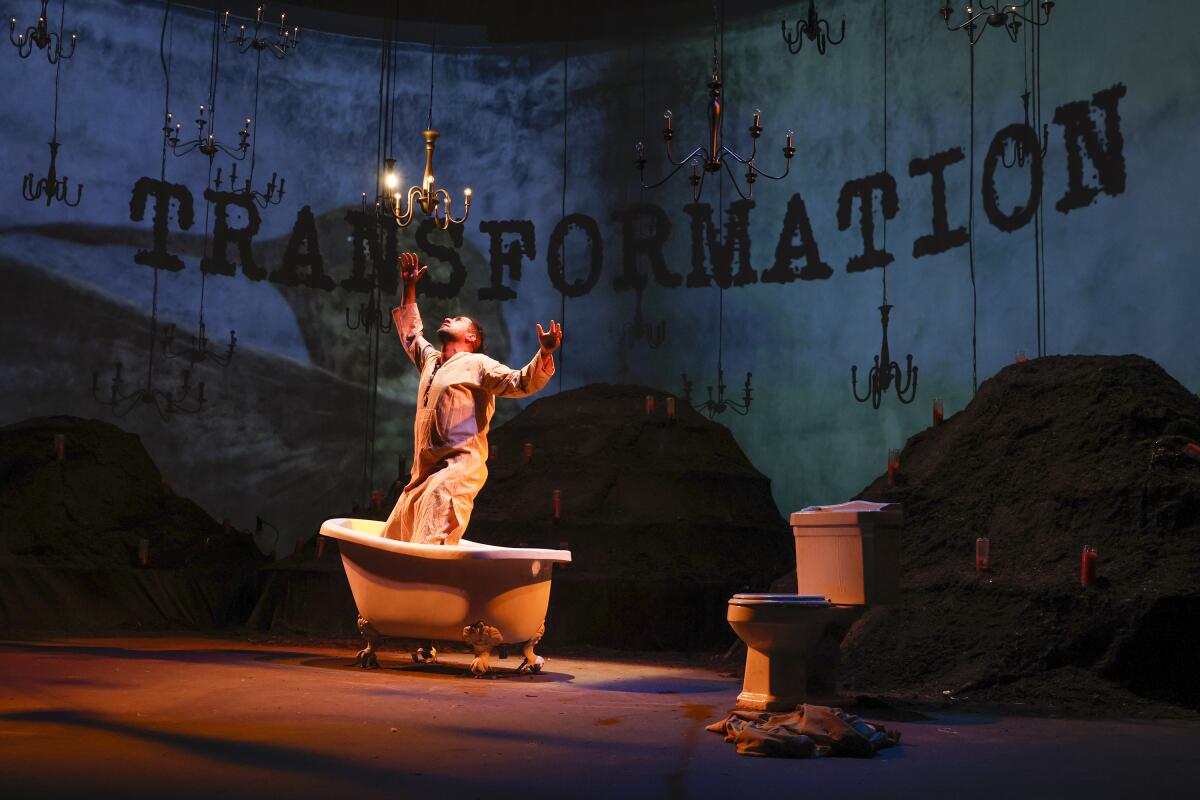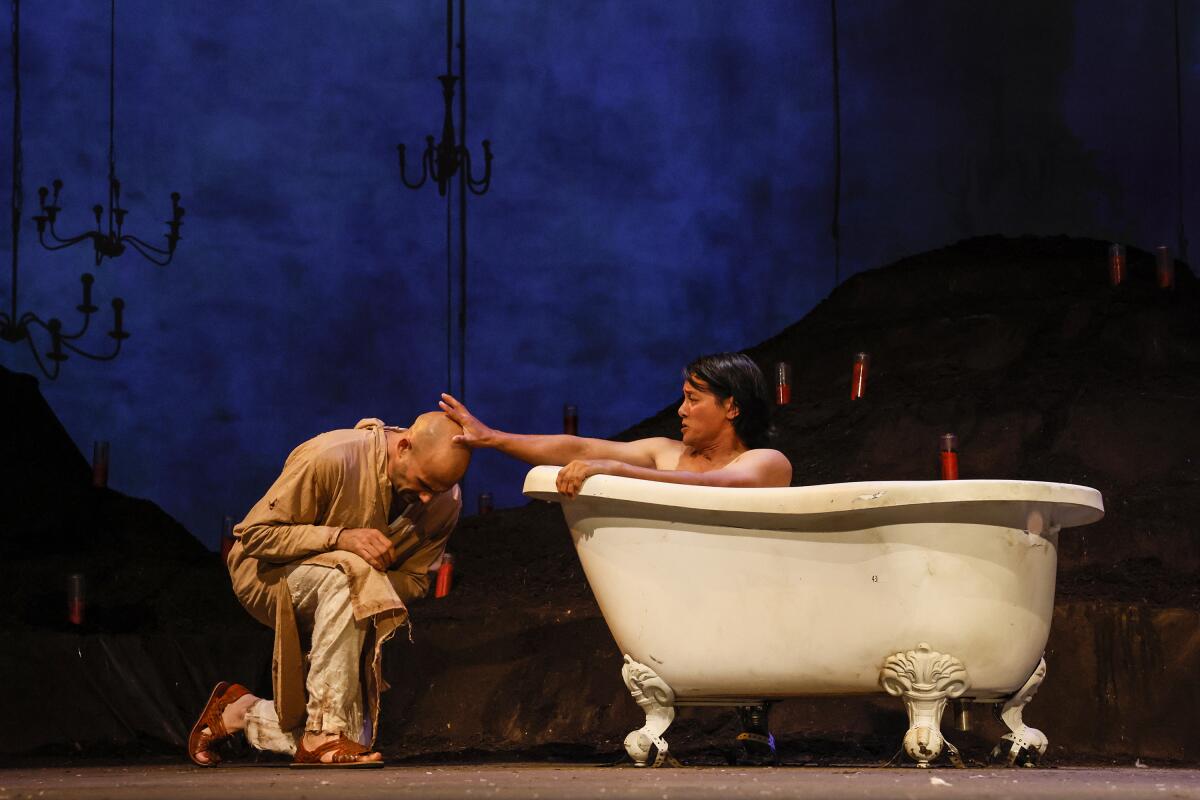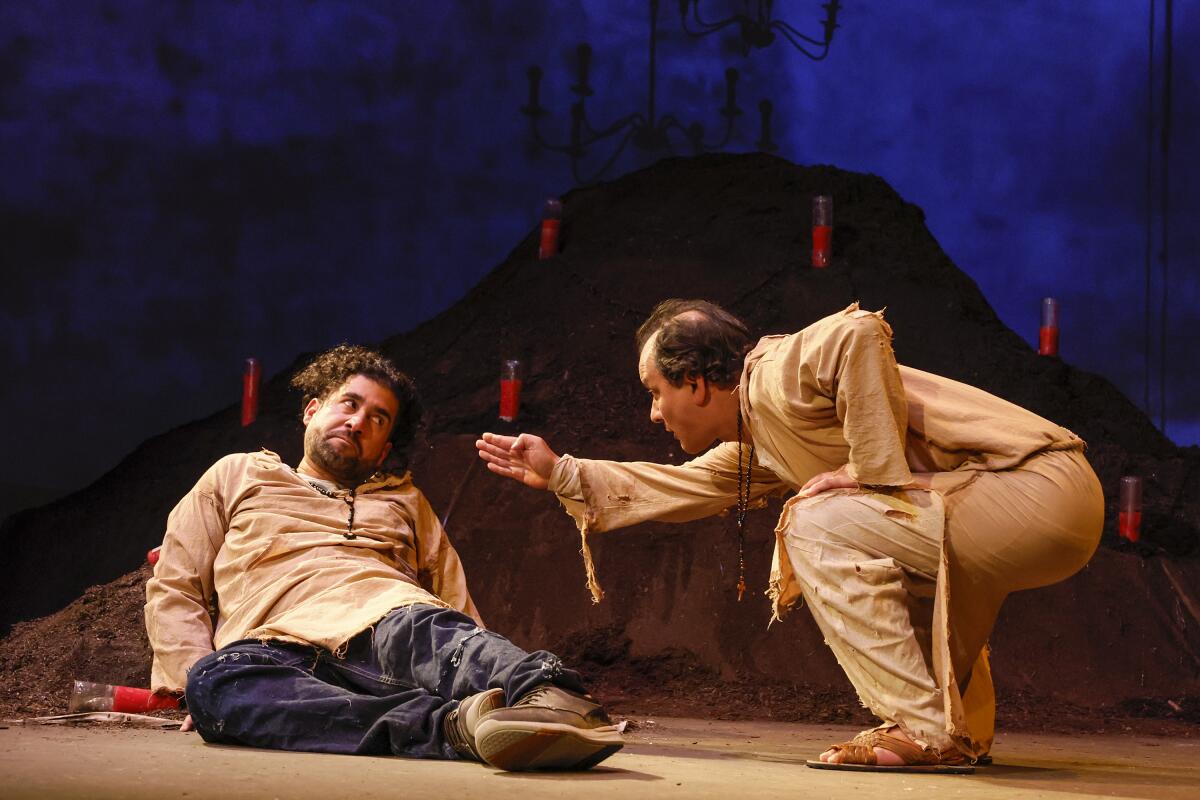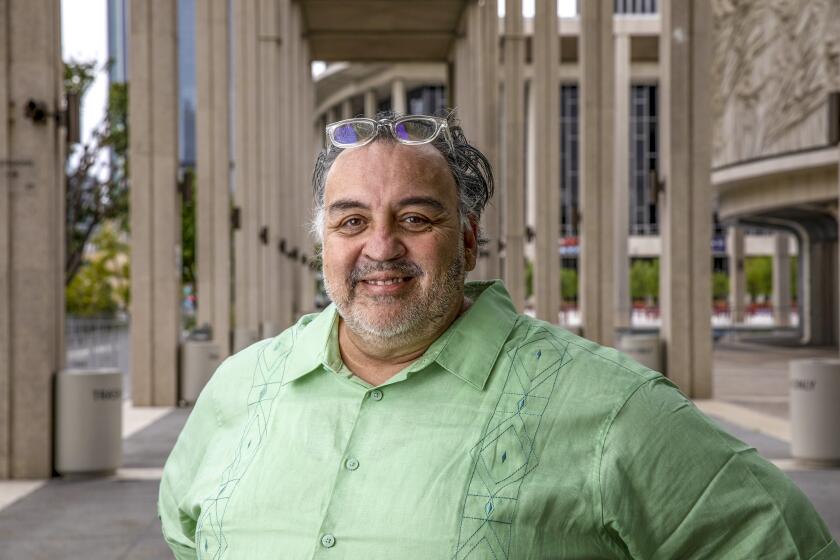Review: Luis Alfaro’s ‘The Travelers’ offers spiritual guidance for a world in perpetual tumult

- Share via
“The Travelers,” a new work by playwright Luis Alfaro, creates an imaginative world unto its own. Poetic in ways that are vividly theatrical, this drama comes to us through an imagination shaped by the legacies of Federico García Lorca and María Irene Fornés.
The setting is as geographically specific as it is purely invented: Grangeville, a drought-stricken village in California’s Central Valley, where farmers and wildlife have to compete against the elements to survive. Video projections offer glimpses of coyotes cavorting in the brush and birds flying over the coast, but the stage translates reality into surreal imagery.
The production at Los Angeles Theatre Center, a presentation by the Latino Theater Company in association with San Francisco’s Magic Theatre and Campo Santo, is summoned into existence via an enchanting set by Tanya Orellana. The diorama-like layout, part altar, part haunted house, contains mounds of soil sprouting candles, a filthy claw-foot bathtub, a forlorn-looking toilet and chandeliers resembling levitating candelabras.
The action takes place at a monastery alongside Highway 99, but the precise GPS coordinates place us on the main road of Alfaro’s unconscious. A group of brothers from a religious order that has existed for 936 years is being cut off by the Archdiocese. Money is as scarce as food, but Brother Santo, the stern leader, believes that sacrifice can only bring the brothers closer to God.

Playwright Luis Alfaro, newly appointed associate artistic director of Center Theatre Group, has a powerful vision for the theater.
The play, which had its world premiere in February at the Magic Theatre under the direction of Catherine Castellanos (Sean San José has restaged the play for LTC), begins with a ritual. The brothers slowly strip down before putting on their religious robes — an act akin to a snake shedding its old skin before growing a new one.
Out of nowhere, a man howling in pain comes barreling at them. His shirt is caked in blood, indicating a gunshot wound. After the stranger collapses, the brothers can’t be certain whether he’s alive or dead. At last a pulse is detected. Brother Santo determines that they must provide care, despite the poverty of their circumstances.
“How do things like this happen? Without Warning. One minute you’re in prayer. And the next, everything changes. It is these times. That make no sense.” Each line is intoned by one of the brothers as though an extension of their prayers.
Alfaro, whose long career as a playwright, teacher and arts advocate has made him a local cultural treasure, has written “The Travelers” as a choral mediation on a period of overwhelming disruption. The play searches not for answers but for guidance on how to move with grace from disaster to disaster. Where might comfort lie and how can purpose be found in an abyss of intelligible meaning?
Juan (Juan Amador), the wounded man seemingly shot out of a cannon into this crumbling monastery, joins the brothers. He is resented by Brother Nacho (Kinan Valdez), the most hot-tempered among them, for being another mouth to feed. The men are stressed by uncertainty as much as by hunger. How much longer will they be able to remain safely secluded from a society that has never had much use, never mind love or concern, for them?

Alfaro proceeds intuitively rather than logically. Spiritual music (beautifully expressed in Christopher Sauceda’s otherworldly sound design) propels a plot that is trying to capture something invisible: natural process. The transition from degeneration to regeneration. Death to life. Security to freedom.
A rebellion against Brother Santo’s leadership is fomented by Brother Nacho, to the skittishness of Brother Daniel (Daniel Duque-Estrada) and Brother Yiyo (Guillermo Yiyo Ornelas). But the driving dramatic movement is internal rather than external.
Another character, Brother Ogie (Ogie Zulueta), an immobile man who spends his days in the bathtub like a chipper Samuel Beckett figure, plays a significant role in the break that eventually occurs. Ogie, who accepts without question that his legs don’t function, is helped each morning into the tub by one of the brothers, where he placidly exists.
Juan hates that he can’t use the toilet in private, but he slowly develops an intimacy with Ogie. It’s hard not to get close when you occasionally have to share a bath. Ogie doesn’t think of himself as disabled, but he finds the word fascinating when Juan uses it to describe him. Ogie lives beyond traditional definitions, but the limbo of his condition imposes severe limitations.
Through playful tickling, Juan discovers that Ogie may not be destined to a life of semi-paralysis. Touch has miraculous power to access unforeseen life. What we understand about ourselves in our isolation may be only a fraction of the whole story.
Juan arrived at the monastery after a brutal encounter at a bar that left his body as battered as his soul had been. He recounts sinful deeds, including a “long bender” of “booze,” “cocaine” and “Fresno motels” that brought him to the depths of hell. Having been granted a second chance by the grace of God, he now wants to help others navigate through their fears to find their new possibilities.
The interpersonal dynamics can get sketchy and the exposition that is offered sometimes seems filtered through gauze. The actors too often ratchet up the volume beyond what the dramatic moment requires. The crackle of melodrama is misplaced. But the tender closeness between Juan and Ogie commands moving choreographic silence that catalyzes the play.
Amador’s Juan is tuned into an inner voice directing him beyond conscious will. He is a man on a mission that only slowly reveals its design. Zulueta’s Ogie is the recipient of a gift that he accepts as freely as his setbacks.
Zulueta’s movements on stage as Ogie awakens into physical renewal are stunningly executed. Movement director Patricia Ong helps “The Travelers” realize its symbolic potential.
“The Travelers” doesn’t always make sense as it plays out. There is room for subtler modulation in the script and the staging. But Alfaro’s work grows in meaning in retrospect. Seeds are planted that flower in the imagination after the show has ended and we resume our own journeys in this world of permanent change.
‘The Travelers'
Where: The Los Angeles Theatre Center, 514 S. Spring Street, L.A.
When: 8 p.m. Thursdays-Saturdays, 4 p.m. Sundays. Ends Oct. 15
Tickets: $22-$48
Contact: www.latinotheaterco.org or (213) 489-0994
Running time: 1 hour, 25 minutes
More to Read
The biggest entertainment stories
Get our big stories about Hollywood, film, television, music, arts, culture and more right in your inbox as soon as they publish.
You may occasionally receive promotional content from the Los Angeles Times.












